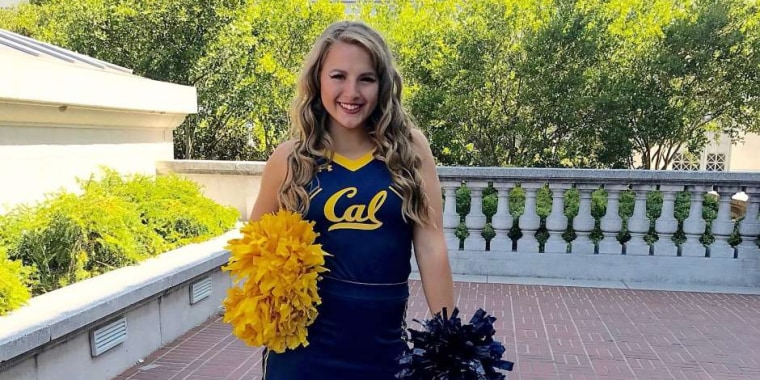A former University of California, Berkeley cheerleader who suffered multiple brain injuries says her coaches ignored her concussion symptoms and forced her to continue to perform stunts.
Melissa Martin, 23, who was a member of Cal's cheerleading and stunt teams from 2017-2018, says her coaches "bullied" her into participating in games and practices despite suffering serious concussions, according to a lawsuit filed Wednesday in Alameda County Superior Court.
Martin is suing the school, the cheerleading team coaches and USA Cheer. She alleges that her injuries were not given the appropriate medical attention and were met with "indifference and even disdain."
Over the course of a few months, she suffered three concussions while under the supervision of head coach Lisa Keys and assistant coach Jessica Chatto, who allegedly required Martin to attend practices and cheer in upcoming football games despite doctor's orders, the lawsuit alleges. In October 2017, Martin was diagnosed with a concussion and was instructed by her doctor to rest, according to the lawsuit.
The next month, Martin was kicked in the head during a routine, and was told by her coach to walk to the college's health services office more than a mile away, the suit said. There she was diagnosed with a second concussion.
Several months later, Martin was struck in the head for the third time while warming up before a basketball game.
The injuries had lingering effects, including her being in "constant pain" and experiencing "depression and anxiety" which lead her to take an academic leave of absence. Martin says she “endured months of therapy, and continues to experience headaches, nausea, confusion and light sensitivity," according to the complaint.
Cal's head cheer coach, Lisa Keys, did not immediately respond to a request for comment.
Martin also claims that Cal and USA Cheer failed to implement and enforce reasonable concussion protocols for cheerleaders.
Cal spokesman Dan Mogulof told NBC News that the university has not yet had an opportunity to review the claims and could not discuss the specific case due to privacy rights, but issued the following statement:
"Cal Athletics closely follows the dictates of a comprehensive policy on concussion management. This policy includes essential elements of concussion education and protocols for management of concussion. Cal’s cheerleading coach maintains safety certification from several national agencies, including with the American Association of Cheerleading Coaches and Administrators, which requires concussion education, and the coach has undergone additional in-person training on health, safety and concussions."
USA Cheer did not comment on Martin's suit, stating only that "nothing is more important than the safety of the athletes."
The lawsuit alleges that the university appears to regard the U.C. Berkeley Cheerleaders as "half-letes," meaning that women on the cheer squad are not deserving of the same training facilities, appropriate protocols for injury and advanced medical treatment that are mandatory for other student athletes.
“While there has been a lot of attention around concussion risks for young men in football, there has not been a corresponding level of concern about head injuries for young women participating in cheerleading programs,” said Martin’s attorney, Jennie Lee Anderson. “The University of California should be leading the charge in concussion prevention, but instead, Ms. Martin’s coaches forced her to cheer when she was still recovering from a brain injury and the University did nothing about it.”
Anderson hopes the claim brings attention to the danger of brain injuries in cheerleading programs: "The same safety protocols that apply to high-profile college athletes must also be in place to protect the cheerleaders, who are both athletes and ambassadors for their schools.”
Martin returned to school this fall for her senior year despite still suffering from symptoms, and hopes to graduate with a degree in Society and Environment.
